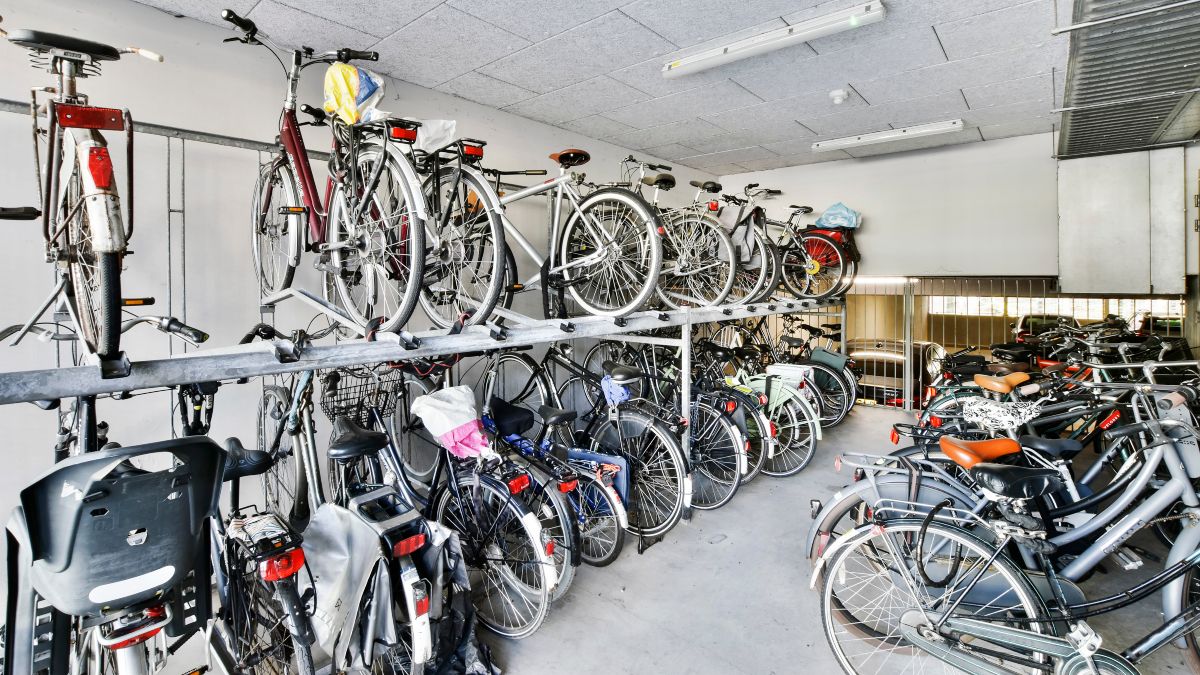
No energy-efficient buildings without adequate bicycle parking and e-bike charging infrastructure
The transport and building sectors are both crucial for the EU’s 2030 goal of cutting emissions by 55%. A new ECF position paper outlines how to include bicycle parking and e-bike charging infrastructure in the Energy Performance of Buildings Directive.
On 14 July, the European Commission published its immense “Fit for 55” package with several new legislative proposals destined to help achieve the political target of reducing Europe’s greenhouse gas emissions by at least 55% by 2030. Transport and buildings are two of the main sectors that have been singled out if the EU is to deliver on this goal.
While the transport and building sectors each have their own individual targets, there are clear interlinkages. These were confirmed during the 2018 revision of the Energy Performance of Buildings Directive (EPBD), which set minimum requirements for charging infrastructure for e-cars. ECF welcomed that recognition but believes there is still a lot of room for improvement when it comes to a holistic view on (e-)mobility. This shortcoming must be addressed, and a Commission proposal for revising the EPBD is expected for November 2021.
The European Cyclists’ Federation (ECF) is proud to publish a new position paper, “Making buildings fit for cycling by revising the Energy Performance of Buildings Directive,” which shall inform the revision process.
The importance of parking and battery charging
Beyond charging infrastructure for e-cars, parking is a major determinant of an individual’s mobility choices; this is true for bicycles, cars and other personal transport modes. Put simply, if there is easy and convenient parking available at the beginning and end of a person’s journey for a specific mode of transport, this person is far more likely to choose that transport mode over another one on a regular basis.
ECF therefore recommends to legislate the following provisions in the forthcoming EPBD revision:
1. Introduce minimum requirements for bicycle parking.
Only six EU member states have minimum quantitative requirements in place, and another three require local authorities to set such rules. ECF recommends to follow the Bulgarian example, which requires a minimum of 1.5 bicycle parking spaces per residential unit in apartment buildings.
2. Introduce minimum requirements for e-bike charging infrastructure.
5.1 million e-bikes were sold in the EU and UK in 2020, accounting to about 25% of total bicycle sales. The bicycle industry predicts that e-bike sales will grow to 17 million units in 2030. As most e-bike batteries are removable, ECF recommends to equip only 10% of bicycle parking spots with charging infrastructure, ie 1.5 e-bike charging points per ten residential units.
3. Improve the social, environmental and mobility performance of buildings by better regulating requirements for car parking.
About half of EU member states have set minimum car-parking requirements at the national level. These are often arbitrary and built beyond demand. Underground parking is also very expensive (on average nearly €30,000 per unit) and has its share in making new housing ever less affordable.
ECF therefore recommends, at the very least, that all minimum car-parking requirements in urban centres that are well served by public transport as well as by safe walking and cycling facilities should be eliminated and replaced by maximums, ie no more than 0.5 parking spots per residential unit).
As the whole economy will become electrified over the next 30 years, demand for electricity will increase manifold. This brings the need for energy-efficiency back into the picture. The bicycle is the most energy-efficient mode of transport. Other than walking, it is also the most space-efficient and affordable mode of transport.
ECF believes the bicycle must play a crucial role in the recast of the Energy Performance of Buildings Directive if the EU is to reduce greenhouse gas emissions by 55% by 2030.
Read ECF’s position paper: “Making buildings fit for cycling by revising the Energy Performance of Buildings Directive” Links: ec.europa.eu/info/law/better-regulation/have-your-say/initiatives/12910-Energy-efficiency-Revision-of-the-Energy-Performance-of-Buildings-Directive_en
Regions:
News category:
Contact the author
Recent news!
Upcoming events
Contact Us
Avenue des Arts, 7-8
Postal address: Rue de la Charité, 22
1210 Brussels, Belgium









